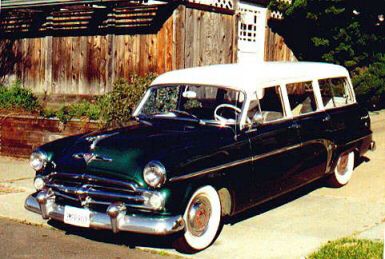|
|

The feature car is a beautiful
Jade green and white 1954 Sierra wagon owned by Bob Philips of Berkeley, CA.
SAN FRANCISCO: One of the rarest postwar American Station Wagons was the 1954 Dodge
Sierra four-door station wagon. The Iona Body Works in Michigan built only 1300 of these
luxury family haulers. It was installed on the longer 119" wheelbase sedan chassis,
rather than the factory built, Plymouth-based 114" wheelbase two-door wagons.
Dodge built a limited number of various different station wagons, both
wood and all steel, since their standard wooden wagon was officially discontinued in 1938,
after only 375 were sold. The first postwar Dodge wagon was introduced in 1949. It was a
wood bodied wagon that used the same configuration as the DeSoto and Chrysler. In 1950, a
Dodge version of the corporate, all steel 123.5 wheelbase wagon called the Coronet Sierra
was added to the line. In 1951, the woody was dropped and the large Chrysler bodied all
steel Sierra went unchanged until the whole Dodge line was totally revised for the 1953
model year.
For 1953, Dodge offered its first V8 and a very attractive new body
that, though based on much of the Plymouth underpinnings, had a look of its own. Sporting
a wide grille and smooth sides, the Dodge received rave reviews from the auto testers of
the time. The station wagon versions were all two doors on the shorter 114"
wheelbase. Six cylinder models were called Meadowbrook Suburbans, while V8 powered cars
carried a Coronet Sierra badge. Late in the year, the Meadowbrook name was dropped and all
Dodges became Coronets. Though 1954 models had only minor trim changes, a longer four door
wagon, again called the Sierra, was offered in both six and eight cylinder form, the
two-door wagons were, regardless of powerplants, all Suburbans.
The Feature Car
This feature car is a beautiful Jade green and white Sierra wagon owned
by Bob Philips of Berkeley, CA. Bob, an Assistant Director in the film business, was
working on an Oldsmobile commercial in Sweet Home, Oregon when he found the car parked at
a Texaco service station. The station manager owned the car and no, it wasn't for sale.
Bob was on the set in the area for almost a week and often went to visit the car, kept
upping his offer and finally reached a number that hit the spot. He drove the Dodge back
to the Bay Area at the end of the shoot.
Though the concept was to replace his aging Volvo wagon with the Dodge
for everyday transport, Bob soon found out that it was a bit too big, thirsty, and hard
for his wife to handle. The Dodge was demoted to weekend family travel and cruise nights.
It features the 241 cube, 140 h.p. Hemi V8, a three-speed stick and overdrive. With
"Armstrong" non-power steering and manual brakes, we can see why the little lady
found it a bit hard to scoot around in town.
The Classic Drive
A look inside presented a large load space and what seemed like acres
of white painted metal. The original two-tone green interior material seemed pretty solid
showing only wear on the driver's seat. All of the controls fall easily to hand and
there's plenty of room, though I felt a bit close to the steering wheel, even with the
seat all of the way back. I hit the starter and the Dodge rumbled to life. A very quiet
single exhaust pipe reduced the engine noise to a light "tuppa-tuppa-tup" that
seemed to find its way through the well-insulated floor. More of a vibration than a noise.
I slipped it into gear and let out the clutch. The Dodge pulled away smoothly with a light
action and no shudder.
Now I thought that a Hemi V8/stick combination would be a real street
scorcher. Wrong! It had bags of torque right at the bottom, great for pulling a trailer,
but not much of anything over about 3800 rpm. A run through the gears produced power that
was on par with an early Ford 239 cube OHV V8 or a good running Chevy 6. This wagon is
heavy and the little Hemi actually has only 11 cubic inches over the standard Dodge
side-valve six. It's smooth as butter and is so under stressed that it will probably last
forever, but a hot rod it is not. The shift action is top notch and the overdrive works
just swell. The steering and brakes are another matter. They work great but the effort
expended would put some gym equipment to shame. I could see why the Mrs. was not fond of
driving the Dodge. Personally, I liked it and found the car direct, predictable and easy
to drive but then again, I'm not driving it in stop and go city driving and taking the
kids to school and soccer practice.
Most of us have become used to power accessories and would welcome any
and all of the modern updates, but then how would we ever remember how it was way back
when? This Dodge was probably the last of the postwar cars, and cars to follow started to
take advantage of all of that WW II aircraft hydraulic technology. This Sierra was a trip
into the past that reminds us of how far we have come. It also reminds us of a time when
things were slower and there was less traffic and traffic controls. The people around
Berkeley loved it as well, as we got waves, shouts and thumbs up everywhere we went. By
Rick Feibusch © AutoWire.Net - San Francisco

Byline: By Rick Feibusch © AutoWire.Net - San Francisco
Column Name: Classic Drive
Topic: 1954 Dodge Sierra Wagon
Word Count: 925
Photo Caption: 1954 Dodge Sierra Wagon
Photo Credits: Rick Feibusch
Series #: 1999 - 33


|
